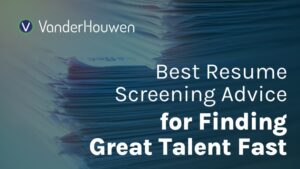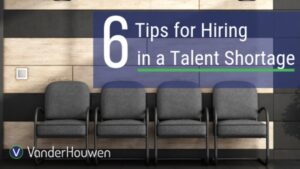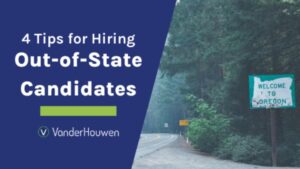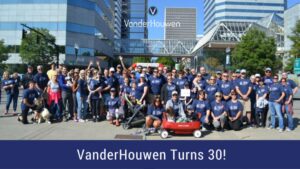5 Tips for an Effective Job Search
Searching for a job can be frustrating, especially if you aren’t getting the traction that you anticipated. Technology—like online job portals, automation, and social media—has made it incredibly easy to find and apply to job postings. Many platforms like LinkedIn and Glassdoor will even notify you of jobs that match your skills, interests, and experience. In other cases, if you’re interested in working at a particular company, you might be able to create a profile within their application portal, sign up for email notifications, and swiftly apply to a job as soon as the position is posted.
Download VanderHouwen’s own mobile app, VanderJobs, on Google Play or iTunes.
But when hundreds of applicants can apply for a job at the click of a button, how can you make sure you stand out? How can you maximize the effectiveness of your job search, to ensure you’re making the most use of your time? We’ve got 5 tips for you.Tip #1: Set a clear goal.
Setting a clear and tangible goal requires a bit of introspection, but it’s an essential part of the job search process. Trust us, hiring managers can tell if you’re disorganized with your job search and “the more, the merrier” isn’t a strategy you should employ when applying to jobs. Are you applying for both administrative and executive positions (with wildly varying salary requirements) at the same company? What that says to a hiring manager is that you don’t have a clear vision of what your skills and experiences are, what value you can bring to a company, and haven’t set any goals. Chances are, even if you’re qualified for one of those jobs, you won’t get called back for any. You have to know what you’re looking for to be able to find it, and your resume, search process, and even interview should be tailored to what that goal is. So take a moment and write down what your goal is for a new job. Is it simply a higher level position? Is it a change of environment? Is it a new industry? Once you’ve set a goal, then you can determine if it is realistic and if you have the right experience to achieve it. If you’re a project coordinator and your goal is to become a project manager, do you have 3-5 years of experience in project coordination? What have you accomplished in previous positions? By creating these parameters ahead of time, you can better set yourself up for success once you start applying for positions.Tip #2: Read the entire job description. Then read it again.
First, read what they wrote. A lot of time and effort goes into a job description, and for good reason. The first few times you read a job description, do it to understand keywords, roles, and requirements. It’ll help you to get an intimate understanding of the job itself, and give you fodder for how to populate your own resume with those same keywords. (We’ll dive into that in Tip #3). Then, read what they didn’t write. Reading between the lines is crucial, and it’ll help you all the way through your interview. What are the intangibles that they’re after? If a job position lists “attendance” as a requirement, this means reliability is critical in that position. If you’re someone who’s never missed a day of work, that’s something to highlight! If they list “flexibility,” it means they need someone who is easygoing and can handle ambiguity. If you’re not good with change, that’s a red flag for you that you aren’t the right fit for that role.Tip #3: Format your resume to match the job description.
Keywords are, well, key. Technology certainly plays a role in this—many companies use Applicant Tracking Systems (ATS), which are essentially algorithms that scan your resume for relevant keywords. The fact of the matter is, hiring managers do this too. Realistically, you have about 10-15 seconds to make an impression on a hiring manager before you get moved to the “yes” or “no” pile. So, get straight to the point about how your experience aligns with what they’re looking for. This is especially critical because it’s often the case that companies use different keywords to describe the same thing. One company may call a role “project coordinator” that a different company refers to as a “program specialist.” That’s why it’s so important to match up keywords—if you have the experience they require, don’t let technical snafus like bad keywords keep your resume from getting a second look. Be sure to also take a look at the order various requirements and expectations are placed in a job description. Match that up to your resume. The first bullet point in a job posting is the most important thing a hiring manager is looking for—so if it’s the first bullet for them, it should be the first bullet in your resume.Tip #4: Prepare for your interviews.
Once those interview requests start coming in (whether it’s a phone interview or an in-person interview), put aside time to prepare. Make sure to put in the time and to do your research beforehand. Think about what questions you can expect to answer during your interview, and outline your responses. Be sure to have actionable accomplishments on hand. Consider checking in with your network. Maybe you know someone who currently works at the company, used to work for the company or knows someone who works for the company. Ask them questions—what do they like about working there? What was their interview like? What did they not like about working there? We’ll end this tip with a final, very important note. At the end of an interview, when a hiring manager asks you if you have questions, say yes! Asking questions is critical to demonstrating that you have genuine interest in the company and the position, but is also an excellent opportunity for you to learn about company culture, other team members, and the role itself. Plus, it’ll give you one final opportunity to sell yourself. Here are two questions we love for candidates to ask hiring managers at the end of an interview: - Where do your best employees end up in 5 years? You can glean a lot of information from how this question in how it is answered. If their best employees tend to move on to other companies, then maybe this position is a stepping stone for other opportunities in the future. If their best employees are in the exact same place as where they started, then that might mean there’s some fantastic company culture here, but not a lot of room for advancement. If their best employees have been promoted, perhaps even multiple times, then you can tell that there’s a lot of room for growth and development. - Do you see any shortfalls in my experience that I can address? It’s a candid question, but it’s a very useful one. If a hiring manager has made up their mind that they want you, and their answer is “no”—great, you’ve reaffirmed that they’re making the right decision. But if they haven’t, this gives you the opportunity to make any necessary clarifications and sell yourself one more time. And even if this question doesn’t change a hiring manager’s mind because they just don’t feel you’re right for the role, you’ll at least leave with some insight into how you can improve your candidacy for future positions.Tip #5: Seek the help of a professional.
Companies aren’t looking to hire you because you’re a resume writer—they want an engineer. Or an accountant. Or an IT specialist. But it’s often the case that how you communicate your expertise is just as important as what your expertise is, and that’s where professionals come in. Whether it’s a state employment office or a staffing agency, you want to connect with someone whose full-time job is finding you a job. Here are just a few benefits of getting professional assistance in your job search: - They’re experts in the marketplace, and they know trends. Professional recruiters have an extensive network of expertise. They know the industry trends, what’s happening in the marketplace, what hiring managers are looking for today, and what hiring managers are looking for tomorrow. This network is their livelihood, so recruiters have their finger on the pulse in terms of what’s most important at local, state, and national levels. - They know just what you can expect in an interview. If a recruiter landed you an interview with a hiring manager at a large tech company, for example, chances are this recruiter has sent candidates to that hiring manager before. That means that the recruiter can prepare you in a deeply personal way. Not only will your recruiter know what interview questions (behavioral and technical) are typical of that company, they can give you insights into that specific hiring manager’s interview style. Should you expect multiple, intensely technical rounds of questions? Or, will it be a more laid back, casual conversation? Should you dress up in business formal or casual? A recruiter will tell you everything you can expect, down to the dress code. - They can optimize and personalize your resume. Should your resume be chronological or skills-based? Are you using the right keywords? Should you use colors on your resume? Do you need to include a skills summary? A professional recruiter has the answer for this—specific to industry, company, and even position. Getting hired for your dream career starts with an effective job search. Be strategic during your search. Apply for jobs that you are qualified for and passionate about. Set goals, do your research on the company, and prepare for your interview. Don’t forget to consult with a professional who can guide you through the process and set you up for success.Ready to get started on your job search? Here’s our job board. Happy hunting!































































































































